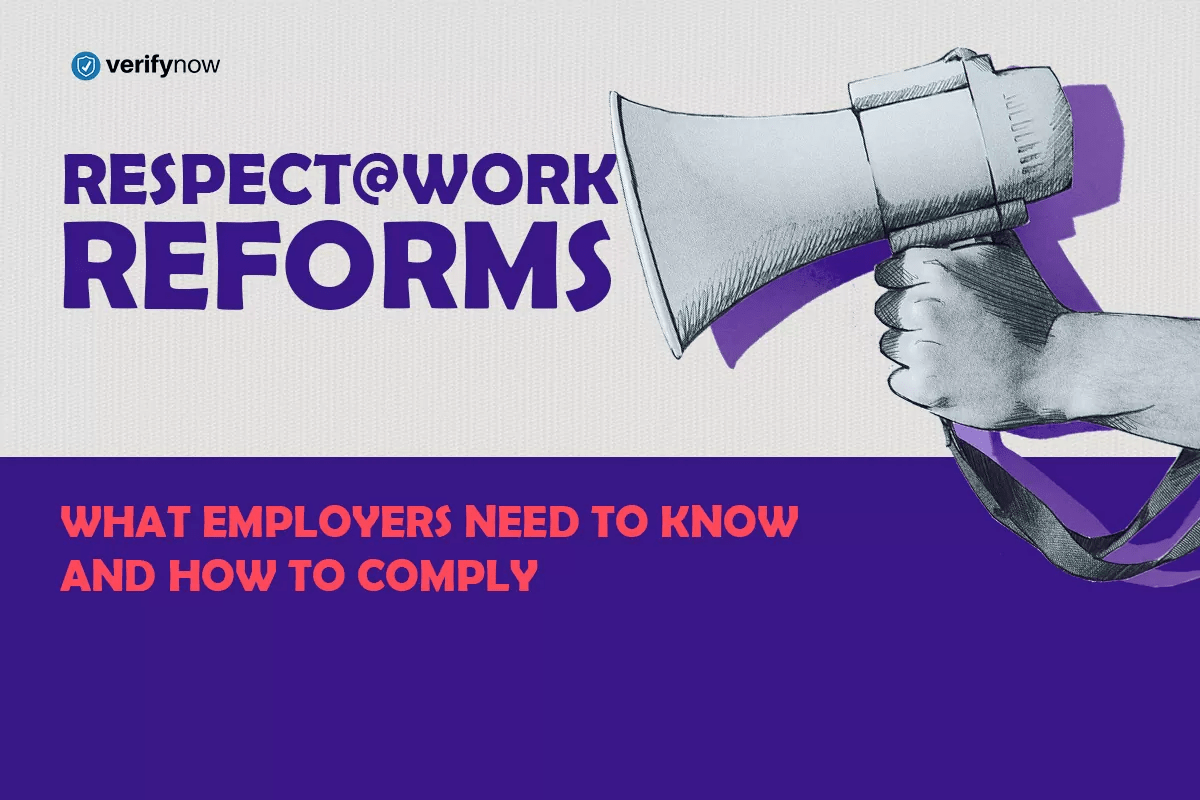- On the 8th of March 2023, Accurate Australia hosted a webinar with experts from Source Legal and HR to discuss the implications of the new Respect@Work Reforms and answer questions about how this would affect businesses present at the event. You cam view a recording of the webinar below, or just read this article for a top-level explanation.
Sexual harassment in the workplace has been a persistent issue for as long as workplaces have existed, affecting individuals of all genders, ages, and professions. This type of harassment can take many forms, including unwanted physical advances, inappropriate comments or jokes, and the distribution of sexually explicit materials.
Unfortunately, victims of sexual harassment often face barriers to speaking out, including fear of retaliation, shame, and the belief that their employers won’t take them seriously. This has led to a widespread culture of tolerance for harassment in the workplace, where many individuals continue to endure these actions without recourse.
In an effort to reform this tolerance, the Australian Human Rights Commission released a report aimed at both the government and private sector that provided 55 suggestions for policy and legislative changes to prevent and tackle sexual harassment in the workplace.
And in December 2022, the Anti-Discrimination and Human Rights Legislation Amendment (Respect at Work) Act 2022 received royal assent – which means some of those recommendations are now law.
So, here’s what that means for employers across Australia, including key changes, additional obligations and steps you must take to ensure compliance.
Positive Duty to Eliminate Sexual Harassment in the Workplace Now Rests with Employers
The “positive duty” is a new obligation that the Anti-Discrimination and Human Rights Legislation Amendment (Respect at Work) Act 2022 imposes on employers to take proactive measures to eliminate sexual harassment and discrimination based on a person’s sex in the workplace.
The Act introduces this new obligation through amendments to the Sex Discrimination Act, which is designed to shift an employer’s focus from merely reacting to conduct that has already taken place, to taking proactive measures that prevent the conduct from happening in the first place.
In other words, the positive duty means that employers are now required to take reasonable and proportionate steps to prevent and address harassment in the workplace rather than simply reacting to complaints when they arise.
Creating a Hostile Workplace Based on Sex is Prohibited by Law
The Act now expressly prohibits a person from subjecting another person to a hostile work environment on the grounds of sex. Creating a hostile work environment on the grounds of sex can take many forms, including:
- Unwelcome physical advances or touching
- Making sexual jokes or comments
- Displaying sexually explicit materials in the workplace
- Making threats or spreading rumours based on a person’s sex or sexual orientation
- Singling out individuals for unfair treatment or exclusion based on their sex
But, if the behaviour (other than these examples) is likely to be seen as offensive, intimidating, or humiliating based on the person’s sex, the Act classifies it as a hostile work environment.
To help employers determine whether an employee has been subjected to a hostile workplace, the Act provides some guidance, including considering the nature and seriousness of the conduct. For example, is it continuous or repetitive?
Where an employer can’t show that they took reasonable steps to prevent a hostile workplace environment, they’ll be held vicariously liable for the unlawful conduct of the other staff members.
The Act Grants Increased Authority to the Australian Human Rights Commission
The Act updates the Australian Human Rights Commission Act to give the Australian Human Rights Commission (AHRC) stronger investigative and enforcement abilities to keep track of and ensure employers follow the positive duty.
With these new powers, the AHRC can:
- Investigate employers’ compliance with the positive duty if they suspect non-compliance
- Provide suggestions to employers to prevent continued non-compliance
- Give a notice that specifies what actions employers must take to address their non-compliance and in what time frame
- Ask the Federal Court or Federal Circuit and Family Court of Australia to enforce the notice
- Enter into an enforceable undertaking to ensure their compliance
- Provide guidelines to help employers follow their positive duty obligations
- Inquire into any matter that may involve discrimination
- Grant permission to a representative group to speak on behalf of one or more affected persons at conciliation and in court
These new powers for the AHRC will start a year after the Respect at Work Act 2022 is officially approved, giving employers time to understand and start following the positive duty.
Reduced Threshold for Finding Sexual Harassment in the Workplace
The rules for defining sexual harassment at work have changed. Before, the nature of the behaviour had to be “seriously demeaning”. Now, it just needs to be “demeaning”, making it easier to prove that sexual harassment has taken place.
Victimising Behavior Can Lead to Both Civil and Criminal Complaints of Discrimination
The recent amendments to all Commonwealth anti-discrimination laws have established that victimisation can serve as grounds for both a criminal complaint and a civil action for illegal discrimination.
These modifications also explicitly state that federal courts now have the authority to hear cases of unlawful discrimination under the AHRC Act if the alleged discrimination is a result of victimisation and is pursued as a civil lawsuit.
The Public Sector Now Has Reporting Requirements
The Workplace General Equality Act previously only mandated the private sector to submit annual reports to the Workplace Gender Equality Agency. However, since the introduction of the Respect at Work Act, the Commonwealth public sector also have to submit yearly reports on six gender equality indicators.
What Your Business Should Be Doing Now?
While the new powers of investigation and enforcement granted to the AHRC will be effective in December 2023, your obligations outlined by the Respect at Work Act 2022, including the positive duty, have become active since its royal assent.
This means that your organisation must take immediate steps to comply with these obligations and duties.
So, if you haven’t already, you should consider taking the following steps to ensure compliance with the positive duty to eliminate sexual harassment in your workplace:
- Develop a comprehensive workplace policy on sexual harassment that clearly outlines the definition of sexual harassment, prohibited behaviour, and the reporting process.
- Provide training to all employees, including management and supervisory personnel, on preventing sexual harassment and the rights and responsibilities of employees.
- Establish a reporting process for employees to confidentially report incidents of sexual harassment and ensure that all reports are promptly and thoroughly investigated.
- Foster a positive workplace culture that values and respects all employees, including creating an open and inclusive environment where employees feel comfortable reporting incidents of harassment.
- Regularly review and update the workplace policy and training programs to ensure they are up-to-date and effective in preventing sexual harassment.
- Take appropriate and prompt action when employees report incidents of sexual harassment, including providing support to the victim, conducting a fair and impartial investigation, and taking disciplinary ac when necessary.
- Regularly monitor and assess the effectiveness of the workplace policy and programs to identify improvement areas and make necessary changes.
- Ensure that all employees know their rights and responsibilities under the policy, including the right to complain and the obligation to treat others with respect and dignity in the workplace.
Key Takeaways
The Respect at Work Act of 2022 marks a significant step forward in addressing sexual harassment and discrimination in the workplace. With the expansion of the powers of the Australian Human Rights Commission and the introduction of a positive duty for employers, the Act provides more comprehensive tools for preventing and addressing this persistent issue.
Additionally, the lowered threshold for finding harassment on the grounds of sex and the recognition of victimising conduct as a basis for civil and criminal complaints signal a commitment to creating safe and inclusive working environments for all employees.
Overall, the Respect at Work Act represents a hopeful future for eliminating workplace sexual harassment and discrimination in Australia.
To ensure compliance with the new Act, you must take proactive steps such as developing a comprehensive workplace policy, providing training and fostering a positive workplace.
However, each organisation’s specific needs and circumstances may vary, and it’s important for employers to seek further advice from experts, such as employment lawyers or HR professionals, to ensure that their workplace is fully compliant with all relevant laws and regulations.



